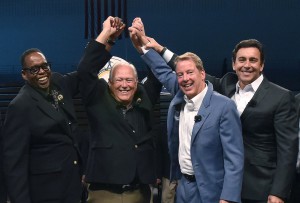Workers at both Ford Motor Co. and General Motors voted to accept each of their new four-year contract offers, in the process ending what had turned into an unexpectedly contentious round of negotiations – workers at Fiat Chrysler Automobiles soundly rejecting their own first contract offer.
A variety of offers pitted not only the United Auto Workers Union against Detroit’s Big Three but also saw the UAW having to fend off more militant members of the union. Starting with President Dennis Williams on down, Autoworkers leaders mobilized to sell a revised Chrysler contract. But they continued to run into trouble even with more lucrative offers from GM and Ford.
At the smaller of the two, 51.3% of production workers and 52.4% of Ford’s skilled tradesmen voted for the contract. Among other things, that vote will earn 53,000 Ford workers ratification bonuses of $8,500.
“Through a fair and democratic process UAW-Ford members have delivered job security and strong economic gains for their families and communities,” said Jimmy Settles, vice president of the UAW’s Ford department.
The situation was somewhat different at GM. That maker saw mixed results from its own balloting, production workers accepting their first offer but skilled trades turned thumbs down. UAW leaders quickly said the new contract was on hold, though they set out only to renegotiate terms cover the skilled workers.
On Friday, Cindy Estrada, the head of UAW bargaining at GM, send a letter to the rest of her team, advising them “The General Motors Co. was notified on Nov. 20 that the agreement has been ratified.”
(GM/UAW deal announced at the deadline. Click Here for the story.)
The twin announcements wrap up an unexpectedly long round of bargaining that began on July 13th when UAW President Williams and negotiating chief Estrada met with GM’s CEO Mary Barra and her team, a grins-and-handshake session meant to express optimism by both sides.

UAW Pres Dennis Williams, Ford Chairman Bill Ford and CEO Mark Fields shake hands as talks get underway on July 23rd, 2015.
The UAW wound up picking Fiat Chrysler as its target as negotiations approached the September 14th deadline. But while bargainers missed their deadline, they kept talking and employees kept working, a settlement coming a few hours into the morning.
But it immediately ran into criticism and, when it came time for a vote, the workers issued a loud, “no,” embarrassing Williams and forcing a second round of talks that brought some modest improvements – and a subsequent “yes” vote.
By the middle of the past week, it began looking like the same thing would happen again at Ford, workers at some of the maker’s bigger plants voting against ratification. As with FCA, Ford did agree to effectively phase out the much-hated two-tier wage system established in 2007, as Detroit’s three carmakers all appeared heading for bankruptcy – a fate that eventually did claim GM and the old Chrysler Corp.
Many of the second-tier workers hired since 2010 will reach parity with line veterans within the next four years, said Settles, who noted the contract also secured more than 9 billion dollars in new investment in Ford plants in the U.S. The investment will protect union jobs, he said.
However, there were irksome shortfalls for activists, such as the fact that Ford was allowed under the contract to proceed with plans to move production of several small cars to Mexico. That was an issue contentious enough to be grabbed by GOP presidential candidate Donald Trump.
UAW leaders mobilized again after workers at two plants in Louisville, Kentucky rejected their offer from Ford last week. And it paid off with favorable margins topping 70% at the last large plants to vote, Dearborn Truck and Dearborn Stamping.
“We are pleased,” said John Fleming, Ford vice president of labor relations. “This agreement provides a good foundation for Ford Motor Company, our employees and our communities as we work together to create an even stronger business in the years ahead,” Fleming said.
Officials at GM issued an equally upbeat note.
(VW reverses course, admits additional emissions cheating. Click Here for this breaking story.)
UAW Pres. Williams has to be grateful, as well, to see the negotiations wrap up. They proved far more difficult than expected for his first time as union head. And time consuming, as the UAW has been busy elsewhere. It this week won an important ruling from the National Labor Relations Board setting up a long-sought organizing vote at the Volkswagen plant in Chattanooga, Tennessee. Separately, the UAW locked down new ties to IG Metall, Germany’s powerful manufacturing union.
That could help the American union finally crack the door and organize workers at the U.S. plants run by BMW and Mercedes-Benz. And it could add momentum to long-stalled efforts to unionize the Japanese “transplants” that today dot the South.
(Click Here for more on the UAW – IG Metall partnership.)
(Paul A. Eisenstein contributed to this report.)


And once again the retirees who gave up so much during the bailout get nothing. The big three have got it figured out now. Just wave a big sign in bonus in front of the workers and they will except anything.